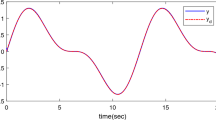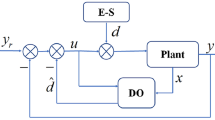Abstract
Focusing on one class of nonlinear systems with input saturation, the adaptive fuzzy dynamic event-triggered control problem is successfully solved. A dynamic event-triggered mechanism is adopted to save the communication burden of the system, and is integrated into the controller design process based on the backstepping technique. For handling the asymmetric input saturation, an auxiliary system with the same order as the considered system is constructed. Analysis problems caused by unknown continuous functions are efficiently tackled by applying the approximation theory of fuzzy logic systems. It is proven that all the signals of the resulting closed-loop system are bounded via Lyapunov stability analysis. Both numerical and practical simulations are presented to demonstrate the effectiveness of the theoretical results.
Similar content being viewed by others
References
Lei Y F, Li J M, Zhao A L. Adaptive neural networks control for uncertain parabolic distributed parameter systems with nonlinear periodic time-varying parameter. Sci China Tech Sci, 2022, 65: 1482–1492
He X Y, Wang Q Y, Hao Y Q. Finite-time adaptive formation control for multi-agent systems with uncertainties under collision avoidance and connectivity maintenance. Sci China Tech Sci, 2020, 63: 2305–2314
Chen J, Li J, Yuan X. Global fuzzy adaptive consensus control of unknown nonlinear multiagent systems. IEEE Trans Fuzzy Syst, 2020, 28: 510–522
Yang C, Jiang Y, He W, et al. Adaptive parameter estimation and control design for robot manipulators with finite-time convergence. IEEE Trans Ind Electron, 2018, 65: 8112–8123
Pan Y, Wu Y, Lam H K. Security-based fuzzy control for nonlinear networked control systems with DoS attacks via a resilient event-triggered scheme. IEEE Trans Fuzzy Syst, 2022, doi: https://doi.org/10.1109/TFUZZ.2022.3148875
Cui R, Yang C, Li Y, et al. Adaptive neural network control of AUVs with control input nonlinearities using reinforcement learning. IEEE Trans Syst Man Cybern Syst, 2017, 47: 1019–1029
Wu K J, Zhang P X, Wu H. A new control design for a morphing UAV based on disturbance observer and command filtered backstepping techniques. Sci China Tech Sci, 2019, 62: 1845–1853
Ge S S, Wang C, Lee T H. Adaptive backstepping control of a class of chaotic systems. Int J Bifurcation Chaos, 2000, 10: 1149–1156
Pan Y, Li Q, Liang H, et al. A novel mixed control approach for fuzzy systems via membership functions online learning policy. IEEE Trans Fuzzy Syst, 2022, 30: 3812–3822
Wang J, Yang C, Xia J, et al. Observer-based sliding mode control for networked fuzzy singularly perturbed systems under weighted try-once-discard protocol. IEEE Trans Fuzzy Syst, 2022, 30: 1889–1899
Lin G, Li H, Ma H, et al. Human-in-the-loop consensus control for nonlinear multi-agent systems with actuator faults. IEEE CAA J Autom Sin, 2022, 9: 111–122
Li H, Wu Y, Chen M. Adaptive fault-tolerant tracking control for discrete-time multiagent systems via reinforcement learning algorithm. IEEE Trans Cybern, 2021, 51: 1163–1174
Liu Z, Lin W, Yu X, et al. Approximation-free robust synchronization control for dual-linear-motors-driven systems with uncertainties and disturbances. IEEE Trans Ind Electron, 2022, 69: 10500–10509
Liang H, Liu G, Zhang H, et al. Neural-network-based event-triggered adaptive control of nonaffine nonlinear multiagent systems with dynamic uncertainties. IEEE Trans Neural Netw Learn Syst, 2021, 32: 2239–2250
Tong S, Min X, Li Y. Observer-based adaptive fuzzy tracking control for strict-feedback nonlinear systems with unknown control gain functions. IEEE Trans Cybern, 2020, 50: 3903–3913
Heemels W P M H, Donkers M C F, Teel A R. Periodic event-triggered control for linear systems. IEEE Trans Automat Contr, 2013, 58: 847–861
Hu A H, Park J H, Cao J D, et al. Event-triggered bipartite consensus over cooperation-competition networks under DoS attacks. Sci China Tech Sci, 2021, 64: 157–168
Wang X X, Liu Z X, Chen Z Q. Event-triggered fault-tolerant consensus control with control allocation in leader-following multi-agent systems. Sci China Tech Sci, 2021, 64: 879–889
Zhang Y, Li H, Sun J, et al. Cooperative adaptive event-triggered control for multiagent systems with actuator failures. IEEE Trans Syst Man Cybern Syst, 2019, 49: 1759–1768
Chen J, Li J, Guo Y, et al. Consensus control of mixed-order nonlinear multiagent systems: Framework and case study. IEEE Trans Cybern, 2021, 1–10
Li Z, Ren Z, Zhao K, et al. Human-cooperative control design of a walking exoskeleton for body weight support. IEEE Trans Ind Inf, 2020, 16: 2985–2996
Hu X, Li Y, Hou Z, et al. Event-triggered prescribed performance adaptive fuzzy asymptotic tracking of nonstrict-feedback nonlinear systems. Int J Robust Nonlinear Control, 2021, 31: 5776–5795
Liu X, Xia J, Wang J, et al. Interval type-2 fuzzy passive filtering for nonlinear singularly perturbed PDT-switched systems and its application. J Syst Sci Complex, 2021, 34: 2195–2218
Chen Z, Han Q L, Yan Y, et al. How often should one update control and estimation: Review of networked triggering techniques. Sci China Inf Sci, 2020, 63: 150201
Ding D, Wang Z, Ho D W C, et al. Observer-based event-triggering consensus control for multiagent systems with lossy sensors and cyber-attacks. IEEE Trans Cybern, 2017, 47: 1936–1947
Xu Y, Wu Z G. Distributed adaptive event-triggered fault-tolerant synchronization for multiagent systems. IEEE Trans Ind Electron, 2021, 68: 1537–1547
Liang H, Guo X, Pan Y, et al. Event-triggered fuzzy bipartite tracking control for network systems based on distributed reduced-order observers. IEEE Trans Fuzzy Syst, 2021, 29: 1601–1614
Jia T, Pan Y, Liang H, et al. Event-based adaptive fixed-time fuzzy control for active vehicle suspension systems with time-varying displacement constraint. IEEE Trans Fuzzy Syst, 2022, 30: 2813–2821
Wang L, Chen C L P. Reduced-order observer-based dynamic event-triggered adaptive NN control for stochastic nonlinear systems subject to unknown input saturation. IEEE Trans Neural Netw Learn Syst, 2021, 32: 1678–1690
Zhang H, Xi R, Wang Y, et al. Event-triggered adaptive tracking control for random systems with coexisting parametric uncertainties and severe nonlinearities. IEEE Trans Automat Contr, 2022, 67: 2011–2018
Shen J, Lam J. Analysis of positive systems with input saturation: Invariant hyperpyramids and hyperrectangles. IEEE Trans Automat Contr, 2022, 67: 3005–3012
Gao H, Li Z, Yu X, et al. Hierarchical multiobjective heuristic for PCB assembly optimization in a beam-head surface mounter. IEEE Trans Cybern, 2022, 52: 6911–6924
Guo J H, Luo Y G, Wang J Y, et al. An adaptive cascade trajectory tracking control for over-actuated autonomous electric vehicles with input saturation. Sci China Tech Sci, 2019, 62: 2153–2160
Huang C D, Cao J D. Comparative study on bifurcation control methods in a fractional-order delayed predator-prey system. Sci China Tech Sci, 2019, 62: 298–307
Zhao X, Yang H, Xia W, et al. Adaptive fuzzy hierarchical sliding-mode control for a class of MIMO nonlinear time-delay systems with input saturation. IEEE Trans Fuzzy Syst, 2017, 25: 1062–1077
He W, Dong Y, Sun C. Adaptive neural impedance control of a robotic manipulator with input saturation. IEEE Trans Syst Man Cybern Syst, 2016, 46: 334–344
Huang B, Song S, Zhu C, et al. Finite-time distributed formation control for multiple unmanned surface vehicles with input saturation. Ocean Eng, 2021, 233: 109158
Hu H, Wang B, Cheng Z, et al. A novel active fault-tolerant control for spacecrafts with full state constraints and input saturation. Aerosp Sci Tech, 2021, 108: 106368
Ma H, Li H, Lu R, et al. Adaptive event-triggered control for a class of nonlinear systems with periodic disturbances. Sci China Inf Sci, 2020, 63: 150212
Chen M, Tao G, Jiang B. Dynamic surface control using neural networks for a class of uncertain nonlinear systems with input saturation. IEEE Trans Neural Netw Learn Syst, 2015, 26: 2086–2097
Chen M, Xiong S, Wu Q. Tracking flight control of quadrotor based on disturbance observer. IEEE Trans Syst Man Cybern Syst, 2021, 51: 1414–1423
Na J, Huang Y, Wu X, et al. Adaptive finite-time fuzzy control of non-linear active suspension systems with input delay. IEEE Trans Cybern, 2020, 50: 2639–2650
Zhang H, Liu Y, Wang Y. Observer-based finite-time adaptive fuzzy control for nontriangular nonlinear systems with full-state constraints. IEEE Trans Cybern, 2021, 51: 1110–1120
Li Z, Zhao K, Zhang L, et al. Human-in-the-loop control of a wearable lower limb exoskeleton for stable dynamic walking. IEEE ASME Trans Mechatron, 2021, 26: 2700–2711
Liu Y J, Zeng Q, Tong S, et al. Adaptive neural network control for active suspension systems with time-varying vertical displacement and speed constraints. IEEE Trans Ind Electron, 2019, 66: 9458–9466
Qiu J, Sun K, Rudas I J, et al. Command filter-based adaptive NN control for MIMO nonlinear systems with full-state constraints and actuator hysteresis. IEEE Trans Cybern, 2020, 50: 2905–2915
Li Z, Yu X, Qiu J, et al. Cell division genetic algorithm for component allocation optimization in multifunctional placers. IEEE Trans Ind Inf, 2022, 18: 559–570
Pan Y, Du P, Xue H, et al. Singularity-free fixed-time fuzzy control for robotic systems with user-defined performance. IEEE Trans Fuzzy Syst, 2021, 29: 2388–2398
Li Z, Deng C, Zhao K. Human-cooperative control of a wearable walking exoskeleton for enhancing climbing stair activities. IEEE Trans Ind Electron, 2020, 67: 3086–3095
Li Z, Huang B, Ye Z, et al. Physical human-robot interaction of a robotic exoskeleton by admittance control. IEEE Trans Ind Electron, 2018, 65: 9614–9624
Wang Q S, Zhuang H, Duan Z S, et al. Robust control of uncertain robotic systems: An adaptive friction compensation approach. Sci China Tech Sci, 2021, 64: 1228–1237
Han H G, Zhang J C, Du S L, et al. Robust optimal control for anaerobic-anoxic-oxic reactors. Sci China Tech Sci, 2021, 64: 1485–1499
Xia X Z, Cheng L. Adaptive Takagi-Sugeno fuzzy model and model predictive control of pneumatic artificial muscles. Sci China Tech Sci, 2021, 64: 2272–2280
Author information
Authors and Affiliations
Corresponding author
Additional information
This work was supported by the National Natural Science Foundation of China (Grant Nos. 62003093, 62203119, 62121004, and 62141606), the China National Postdoctoral Program (BX20220095, 2022M710826), the Major Key Project of Peng Cheng Laboratory (Grant No. PCL2021A09), the Natural Science Foundation of Guangdong Province (Grant No. 2022A1515011506), the Local Innovative and Research Teams Project of Guangdong Special Support Program (Grant No. 2019BT02X353), and the Guangzhou Science and Technology Planning Project (Grant No. 202102020586).
Rights and permissions
About this article
Cite this article
Ren, H., Ma, H., Li, H. et al. A disturbance observer based intelligent control for nonstrict-feedback nonlinear systems. Sci. China Technol. Sci. 66, 456–467 (2023). https://doi.org/10.1007/s11431-022-2126-7
Received:
Accepted:
Published:
Issue Date:
DOI: https://doi.org/10.1007/s11431-022-2126-7




